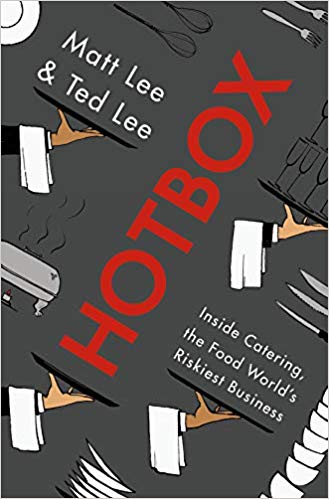You have /5 articles left.
Sign up for a free account or log in.
 Hotbox: Inside Catering, the Food World's Riskiest Business by Matt Lee and Ted Lee
Hotbox: Inside Catering, the Food World's Riskiest Business by Matt Lee and Ted Lee
Published in April 2019
Hotbox is about a world that I didn’t know exists -- high-end catering.
Did you know that fancy catered dinners are way more expensive, per eater, than even the fanciest of restaurants? That it is not unusual for the wealthy to drop between $1,000 and $3,000 per person at a catered dinner, wedding or charity event? I had no idea.
The late (and much missed) Anthony Bourdain created an entire nonfiction genre when he published Kitchen Confidential, back in 2000. What has followed was a boomlet of books that describe how the restaurant industry, and other service industries, functions from the inside. These books include Heat; Blood, Bones & Butter; Waiter Rant; and many others.
Hotbox, by cookbook authors and chefs Matt and Ted Lee, extends this genre to the world of catering for the 1 percent. In researching the book, the Lee brothers worked at kitchen assistants (or KAs) at several of NYC’s top catering companies. They worked both the prep kitchens, where all the food is cooked before it is sent to the events, and doing finishing and plating at parties (fiestas).
Why might higher ed people be interested in reading Hotbox?
I always find it fascinating to think about industries, and the jobs that people do, that are totally outside academia. The world of high-end catering is its own universe. It is a small enough world where everyone in a city such as NYC who works in the industry knows each other. Catering has its own values, language, norms. It is a culture that is known to the people who do the work, but that is little understood by outsiders.
There is likely no crossover between the worlds of higher education and that of high-end catering. Professors don’t become KAs, or vice versa. (Although maybe the crossover is at culinary institutions such as Johnson & Wales University). High-end catering is as cutthroat, competitive and insular as any academic discipline.
We seem to spend much of our time and energy in academia longing for some golden era when public funding and students were plentiful and securing a tenure-track job was easier than winning the lottery.
Academics may work very hard -- I do believe that is true -- but we are lightweights compared to the daily obstacles that caterers must face. Caterers must prepare and serve meals for the world’s most demanding people (the rich), without the benefit of a kitchen. (Caterers create their own on-premise food-prep infrastructure, almost never using the ovens or fridges at the venue).
The sheer challenge of serving tens or hundreds of picky eaters at the same time, while dealing with the growing number of food preferences and allergies (gluten-free, vegan, etc., etc.) would be enough to break most spirits. But caterers do this every night, and then get up and do it all again the next day.
Beyond sociological interest, another reason for higher ed people to read Hotbox is that we are likely to eat (at some point) a higher ed-related catered meal. How much thought do we give to the people who prepare and serve our dinners at conferences or during on-campus events?
The work to prepare meals at university-related events or professional meetings is mostly invisible. We don’t converse with the people who have set up the room, who have cooked our food or who will clean everything up. If we are lucky, we say a word of thank you to the servers who bring the various dishes to the table.
Higher ed readers of Hotbox will likely not look at the food we eat at our events, parties and conferences in the same way. Some readers of Hotbox may even try to venture behind the curtains where our food is being prepared, just to say thank you.
What are your favorite books in the Kitchen Confidential genre?
What are you reading?




